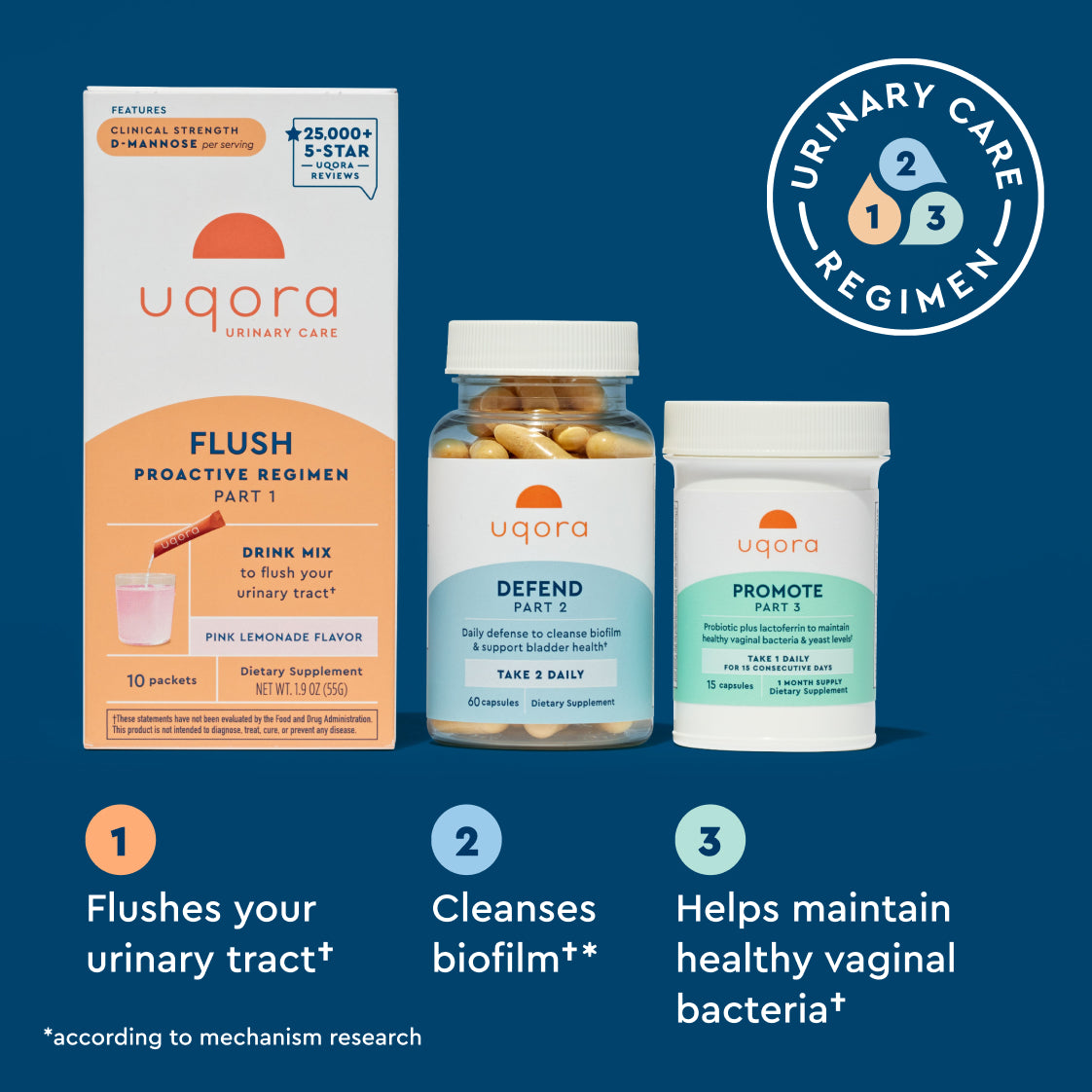D-Mannose and Urinary Tract Health
What is D-Mannose?
D-Mannose is a naturally occurring simple sugar, also known as a monosaccharide. Chemically speaking, D-Mannose has the same formula as glucose but with a different atom arrangement. It occurs naturally in the human body, and can also be found in certain types of produce.
How Does D-Mannose Connect to Urinary Health?
D-Mannose has been shown to bind to microorganisms in the urine. So when present in urine, D-Mannose binds to microorganism structures and can help flush them out. Simply put, D-Mannose serves as a decoy, attracting microorganisms, encouraging them to be released through urine.
It’s key to understand that D-Mannose cannot directly kill microorganisms. Thus, D-Mannose is not a replacement for antibiotics or infection treatment.
Instead, D-Mannose can be taken proactively to promote overall urinary tract health.
How the Uqora Regimen Compares to D‑Mannose on its Own:
-
Uqora:
✔️Binds with microorganisms
✔️Flushes the urinary tract
✔️Cleanses biofilm*
✔️Balances urogenital microbiome**
✔️Supports bladder wall integrity -
D-Mannose:
✔️Binds to microorganisms
✔️Flushes the urinary tract
❌ Cleanses biofilm
❌ Balances urogenital microbiome
❌ Supports bladder wall integrity
Where is D-Mannose found?
As D-Mannose is closely related to glucose, it can be found in various fruits such as cranberries, apples, and peaches. Cranberries and cranberry juice are often associated with urinary tract health and are one of the most widely touted natural dietary sources of D-Mannose.
However, there are only trace amounts of D-Mannose present in cranberries.
What Are the Side Effects of D-Mannose?
D-Mannose is generally recognized as safe (GRAS) for the general public by the U.S. FDA when used as directed. D-Mannose in high doses has been linked to minimal side effects in some individuals. Potential side effects include gastrointestinal distress, such as mild cases of diarrhea and bloating.
D-Mannose does not significantly raise blood sugar levels, however, individuals with diabetes should monitor blood sugar levels while taking D-Mannose supplements.
My experience with UTIs inspired me to start Uqora

In 2018 I had 8 UTIs. I was miserable and desperate for a way to get ahead, but was repeatedly told there was little I could do. This experience inspired me to start Uqora. Built in collaboration with doctors and scientists, Uqora makes UTI relief products and proactive urinary tract supplements so you can finally get ahead. No matter where you are on your urinary health journey, Uqora is here for you. We're so glad you've found us!
— Jenna Ryan, Uqora Co-founder
Urinary Health Support from Multiple Angles


Each of the products in our Proactive Regimen supports you in a different way, keeping your urinary tract covered from multiple angles. Like D-Mannose, the ingredients in Uqora have been well-researched and were each selected for their unique ability to improve urinary tract health.
You're not alone.
We're helping over 700,000 people of all ages stay healthy with our proactive urinary tract products.
References
- Ala-Jaakkola, R., Laitila, A., Ouwehand, A.C. et al. Role of D-mannose in urinary tract infections – a narrative review. Nutr J 21, 18 (2022). https://doi.org/10.1186/s12937-022-00769-x, https://nutritionj.biomedcentral.com/articles/10.1186/s12937-022-00769-x#Sec15
Ready to get proactive about your urinary health?
👩⚕️ Backed by doctors
🌟 Over 35,000 5-star reviews
💸 60-day Money-back guarantee





